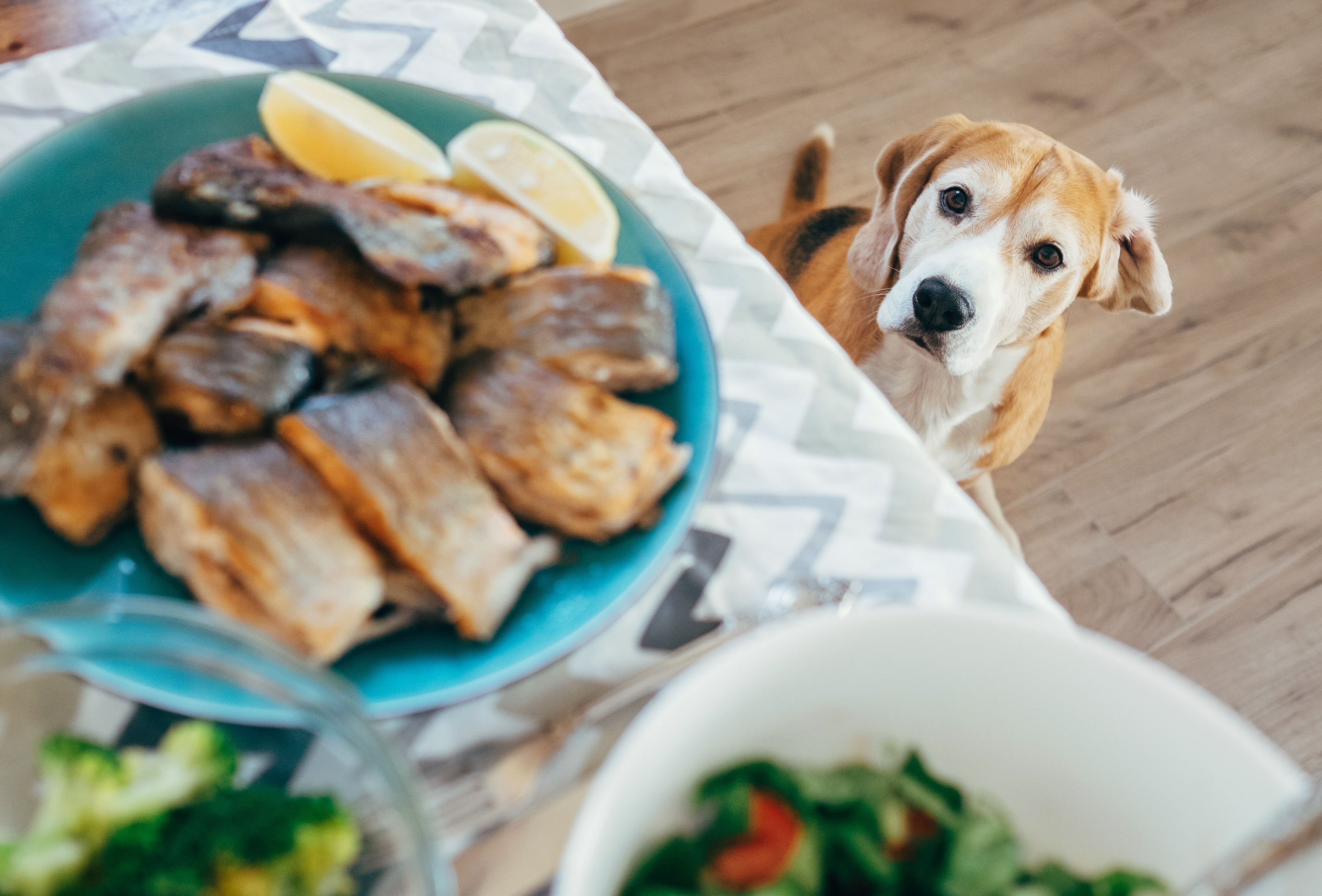Want to know more about feeding fish to your dog? We’re here to help you get to know your haddock from your halibut. Cooked plain – without any added fat, seasoning or sauces – fish is a brilliant addition to your dog’s diet and helps everything from their coat and skin to their joints (thank you omega 3!) What’s even better there’s so many types of fish that are great to give your dog.
We think fish is so good we include it in your dog’s kibble recipe (if they need it!), bake it into a special fish stew wet food recipe (thank cod), and pop it in a treat, too.
What are the benefits of fish for dogs?
It’s easy to digest
Ideal if your dog has a sensitive stomach.
It’s rich in Omega-3
Oily fish like salmon or tuna are rich in fatty acids, otherwise known as omega-3 – which is great news for your dog’s skin and coat.
It tastes good
The different textures and flavours of fish add variety to your dog’s diet.
It’s hypoallergenic
Even if your dog is sensitive to other foods, it’s unlikely they’ll have a reaction to fish. Meat proteins are usually the cause of allergic reactions in dogs.
At tails.com, we use hydrolysed salmon in some of our hypoallergenic diets. Hydrolysed means the proteins have been broken down so they’re easier to digest, and even less likely to trigger an immune response.
What fish shall I cook?
Here are all the types of fish we like to cook our dogs:
White fish
Lean fish including cod and haddock are a great source of protein and B vitamins: B6, B12 and niacin.
Salmon
Salmon is an excellent source of protein, essential fatty acids, vitamins and minerals.
Has your dog fallen for our hand-baked salmon biscuits yet? Made with salmon and linseed for an extra boost to your dog’s coat, they’re the perfect omega-packed treat.
Sardines
This oily fish is rich in essential fatty acids. Watch out for the bones – sardine bones may be small, but can still get caught in your dog’s throat.
Tuna
Can dogs eat tuna? In moderation, yes. It’s packed with essential fatty acids but also high in mercury and histamine, so only let your dog have a little bit.
Atlantic Mackerel
A good source of omega-3, Atlantic mackerel is lower in mercury than other types of mackerel, so it’s safe for your dog to eat.
What fish can dogs not eat?
Now we’ve done the good catch, it’s time for the naughty list. Sadly not all fish is good for your dog, and the fish and seafood your dog can’t eat includes:
Smoked salmon
Plain salmon is fine but when this nutrient-rich fish is smoked, it’s too salty for your dog.
Shellfish
Shellfish – prawns, oysters, mussels, and clams – are filter feeders, so can contain dangerously high levels of toxins like heavy metals. They’re also a common cause of food poisoning. While green-lipped mussels can be a rich source of glucosamine, there are other, safer ways to give your dog this joint-friendly supplement.
Read more: Joint care for dogs
Breaded or battered fish
While fish is good for dogs, stodgy, greasy coatings definitely aren’t. Stick to varieties from the fish counter, and give chip shop versions a miss.
Related blog: What foods are harmful to dogs?
How to prep fish for your dog
It might seem obvious, but if you’re not used to handing or cooking fish, please bear these things in mind before giving your dog some fish to try:
Has it got bones in? And is it fresh? Like us, dogs can choke on bones. Make sure you’ve removed any stray ones before serving (we’ve been known to use tweezers for this very task!). When it comes to serving fish, it’s got to be fresh.
Happy cooking!


very helpful information. I did not know that dog could eat exotic fruit, I’m so chuffed. thanks.
My puppy was going crazy as I was preparing fish for dinner I gave her a tiny piece and she gulped. She would not stop bothering us so we gave her more
So glad we looked up this site now I will feed her more often
My dog can only eat hydrolysed food. Could you please advise as to whether any of your products are prepared by this method. Thank you.
Hi Liz,
Can you please send this question to hello@tails.com so that our team of experts can help you?
Kind regards,
Sophie
Great article, especially as we give Mojo and boiled roce if she ever has a bad bum as she won’t touch her kibble and you are advising we only give small amounts. We didn’t know this.
Basa is cheaper than cod etc? Obviously bone free….
Thanks lots
Lisa and Mojo xx